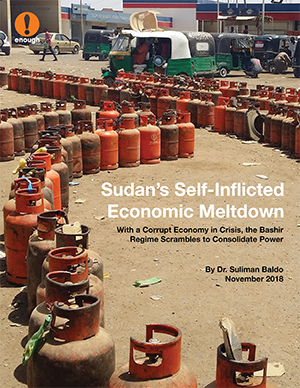
 Download the full report.
Download the full report.
 العربية
العربية
On September 9, 2018, 18 months into one of Sudan’s worst economic crises, President Field Marshal Omar al-Bashir dissolved the Government of National Consensus that took office in May 2017 and appointed a new prime minister, declaring this a first step toward the implementation of sweeping reforms to permanently heal the economy. The new prime minister, Mutaz Musa, stated shortly thereafter that his cabinet would have “400 days and 3,000 hours” to accomplish the task ahead of the 2020 “political horizon,” a thinly disguised reference to the presidential elections slated for that year, in which President al-Bashir will be seeking a new term, de facto his uninterrupted seventh.[i]
President al-Bashir will likely seek this seventh term during an economic crisis. The symptoms of an economy in disarray and hurtling to imminent collapse, which is currently the case, were long in the making and hard to miss—a national currency in freefall, hyperinflation settling in, and foreign investors and lenders kept at bay by evidence of mismanagement of the country’s rich resources and of pervasive corruption protected by the highest institutions of the state. The demise of the national economy was largely self-inflicted and predictable, a result of nearly three decades of structural macroeconomic deformities and distortions.
Despite the regime’s consistent efforts to blame U.S. sanctions for its woes during the preceding 20 years, the period since the end of sanctions shows where the real fault lies. The economy carried the ills that come with the dominance of an autocratic one-party system parading under a thin democratic disguise, characterized in the case of Sudan by the ruthless suppression of political and civic spaces; preference for military rather than political solutions for internal armed conflicts; lack of transparency and accountability for the management of state resources; the prevalence of widespread corruption; and the pillaging of state resources by the ruling elites and their corporate allies—both domestic and international. Any state, even one with the resources to secure lasting prosperity for its population, would be left teetering on the brink of failure by such irresponsible management and looting. Sudan is no exception.
Most impactful among the structural causes of today’s economic crisis is the overwhelming government intervention in the economy through distorted policies and direct participation in trade and business through hundreds of government companies and others owned by senior government officials, members of their families and their business allies, or the ruling party and its deeply entrenched organizations (e.g. youth and women associations and various professional syndicates that adhere to and help reinforce state propaganda). Despite large revenue flows during the 1999-2011 “oil decade,” estimated at $70 billion, Sudan failed to modernize investments in the traditional sectors of agriculture and livestock that together contribute up to 40 percent of Gross Domestic product (GDP) by World Bank estimates. Instead, most of the state’s budgetary resources continue to be allocated to the security sector and state bureaucracy. Worse, during the same oil decade, and while squandering billions on projects dictated by regime consolidation rather than economic feasibility considerations, Sudan added tens of billions of dollars in non-concessionary loans to its crushing debt burden, mainly from China and regional lenders. The debt now stands at an estimated $56 billion and is characterized by the International Monetary Fund (IMF) as unsustainable, representing another structural vulnerability of the economy. All of this comes amid continued violations and abuses of human rights, civil rights, and religious freedom.[ii]
With the situation spiraling out of control, the Government of Sudan has scrambled for quick fixes to address the symptoms of the crisis but failed to address its root causes to date. It opted for crisis management structures and administrative approaches under the defunct cabinet led by First Vice President Retired General Bakri Hassan Salih and, due to a procedural oversight, could not even manage to secure the appointment of a qualified finance minister in the cabinet sworn in on September 14, one who could prioritize sound economic policy over regime security and survival.[iii]
Healing Sudan’s economy and steering it to recovery and growth are inconceivable without the government’s adoption of far-reaching macroeconomic reforms, including the reversal of its spending trends. Sudan’s multi-tiered exchange system has to be fixed; its natural resources need better harnessing for the benefit of the national economy; and credible and independent anti-corruption mechanisms must be introduced instead of recent sham anti-corruption measures. Such sweeping reforms would require a political transformation and a new social contract featuring broader political participation, reconciliation and peace among previously warring parties, empowerment of small businesses, and real protections of property rights. Also required are better respect of and protection for fundamental human rights, including freedoms of belief, expression, and association.
Despite the structural deformities of the economy and the near total absence of these protections, the United States, European Union, and others seek to normalize and encourage investment in Sudan. However, until the aforementioned reforms are introduced, Sudan will likely struggle to attract significant private investments and development aid. Prevailing risks should persuade Sudan’s prospective economic partners to impose appropriate pressures and encourage the exercise of enhanced due diligence practices in response to the high risks of money laundering and illicit financial practices, both of which currently characterize the business environment.
Specifically, the United States government should impose sanctions, pursuant to the Global Magnitsky sanctions program, on the networks involved in the corruption and human rights abuses that perpetuate these unlawful practices. The United States, United Kingdom, and other governments encouraging investment in Sudan should issue Advisories or similar bulletins to banks and others in the private sector highlighting the significant money laundering risks emanating from endemic corruption, the gold trade, and other issues in Sudan. These Advisories can help ensure that the private sector is acting against the transactions and accounts that fuel the corrupt practices currently crippling the Sudanese economy and people. Additionally, and as described in the “Roadmap” Brief accompanying this report, companies should be encouraged through appropriate measures to implement enhanced due diligence to deal with human rights and other risks, including through the UN Guiding Principles on Business and Human Rights, OECD Guidance for Responsible Supply Chains, and Equator Principles. Finally, the United States and other governments should consider establishing public reporting guidelines for companies doing business in Sudan, similar to the Burma Responsible Investment Reporting Guidelines.
Read more: For businesses looking to invest in Sudan, the report is accompanied by a brief that provides a roadmap for responsible economic engagement in the country — one that avoids the pitfalls of being consumed by the current regime’s kleptocratic practices and contributing to the ongoing crisis. Click here to view the brief.

